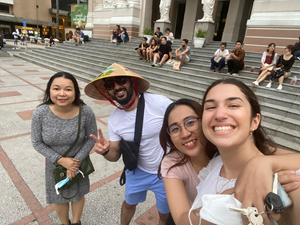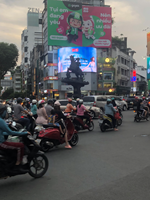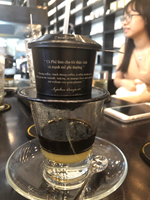The LEADER Project provides current and aspiring entrepreneurs with the analytical tools, thought processes, and decision-making skills to tackle complex business challenges. LEADER instructors (Ivey HBA and MBA students and alumni) deliver a two-week intensive program of cases, lectures, and coaching. LEADER is celebrating its 30th anniversary in 2022. As part of the celebration, Umad Khan, MBA ’22, wrote about his experience teaching in Ho Chi Minh City, Vietnam.
On April 18, 2022, I arrived in Ho Chi Minh City, Vietnam to deliver a two-week business fundamentals course through The LEADER Project with a group of entrepreneurs at the Saigon Innovation Hub. Little did I know then, the experience would be much more exciting than anticipated.
The LEADER Project is an economic development program that aims to empower young entrepreneurs from seven different emerging regions around the world by providing them with business knowledge and skills to help further their businesses. The curriculum is delivered through a unique method of teaching used at Ivey Business School, the case method. This approach allows students to learn business fundamentals through real-world applications that they can apply to their own businesses.
I joined The LEADER Project as part of the logistics team in September 2021. My goal was to work with and learn from some of my brilliant classmates, teach, and, of course, travel to a new country. This past year was a unique year for the program as we were transitioning from virtual to in-person teaching. This meant that in addition to preparing to deliver the program curriculum, we had to figure out how to teach in-person safely and in line with local rules and regulations. Luckily for us, the executive team, advisory board, Ivey, and Western University were there to help us navigate these challenges.
Preparation
I was assigned to our Vietnam site in January. At that time, Vietnam’s borders were closed to foreigners due to COVID-19, and I was planning for the curriculum to be delivered virtually. However, we maintained hope that the situation in Vietnam would improve and the border would open in time for us to travel and teach in-person.
 Luckily, in mid-March, one month prior to our curriculum delivery date, the borders opened. Suddenly, we had to go back to the drawing board and figure out how to make in-person teaching happen. The team also had to get travel visas, flights, and vaccinations along with other pre-requisites for teaching in Vietnam. The team members felt a combination of stress and excitement. With a lot of hard work and determination, we managed to get almost everything in order for travel. One day prior to travel, only two out of four visas were approved. To ensure that we still delivered a strong program, we set about using a hybrid model of teaching. This meant that two instructors taught onsite at the Saigon Innovation Hub while the remaining two taught virtually.
Luckily, in mid-March, one month prior to our curriculum delivery date, the borders opened. Suddenly, we had to go back to the drawing board and figure out how to make in-person teaching happen. The team also had to get travel visas, flights, and vaccinations along with other pre-requisites for teaching in Vietnam. The team members felt a combination of stress and excitement. With a lot of hard work and determination, we managed to get almost everything in order for travel. One day prior to travel, only two out of four visas were approved. To ensure that we still delivered a strong program, we set about using a hybrid model of teaching. This meant that two instructors taught onsite at the Saigon Innovation Hub while the remaining two taught virtually.
Vietnam
 When we landed in Vietnam, we were surprised by the overwhelming crowd of bystanders. It was a huge relief when we saw a sign with our names amongst the people waiting.
When we landed in Vietnam, we were surprised by the overwhelming crowd of bystanders. It was a huge relief when we saw a sign with our names amongst the people waiting.
Over the next two weeks, we spent our time teaching. Perhaps the biggest surprise was how much we as teachers learned from our participants, both inside and outside of the classroom. In the classroom, we refined our own understanding of the business concepts we had learned at Ivey, while also learning about the different businesses our participants wanted to grow and develop and the unique issues they faced. Through our experience, we witnessed the benefits of the case method from the perspective of an instructor. We witnessed students using concepts from cases and posing arguments and hypotheses to apply to their own experiences and businesses. Some of the unique problems we addressed using concepts from Ivey’s cases included marketing worm snacks and scaling a digital art academy for the youth.
 Outside of the classroom, we were learning common Vietnamese phrases, exploring foods such as bánh xèo (a Vietnamese pancake), walking through the scooter-filled streets of Ho Chi Minh city, and – my personal favourite – trying the countless eclectic coffee shops. I have learned that Vietnamese coffee is my new favourite.
Outside of the classroom, we were learning common Vietnamese phrases, exploring foods such as bánh xèo (a Vietnamese pancake), walking through the scooter-filled streets of Ho Chi Minh city, and – my personal favourite – trying the countless eclectic coffee shops. I have learned that Vietnamese coffee is my new favourite.
The most interesting aspect of travelling with The LEADER Project was learning more about Vietnam and its culture. I didn’t expect to find the culture of Vietnam so rich in entrepreneurship. The people I met and spoke with were excited to hear new ideas and wanted to turn them into businesses. One of the students even explained that in Vietnam ideas are discussed over dinner and trialed and tested the following morning! Moreover, the hospitable nature of the Vietnamese allowed us to explore as much food and as many places as we could within that short trip. A highlight was when a local farmer taught me how to make bánh xèo.
Overall, I had an extremely enriched experience from both a professional and personal standpoint filled with many unique memories that I will carry with me.




